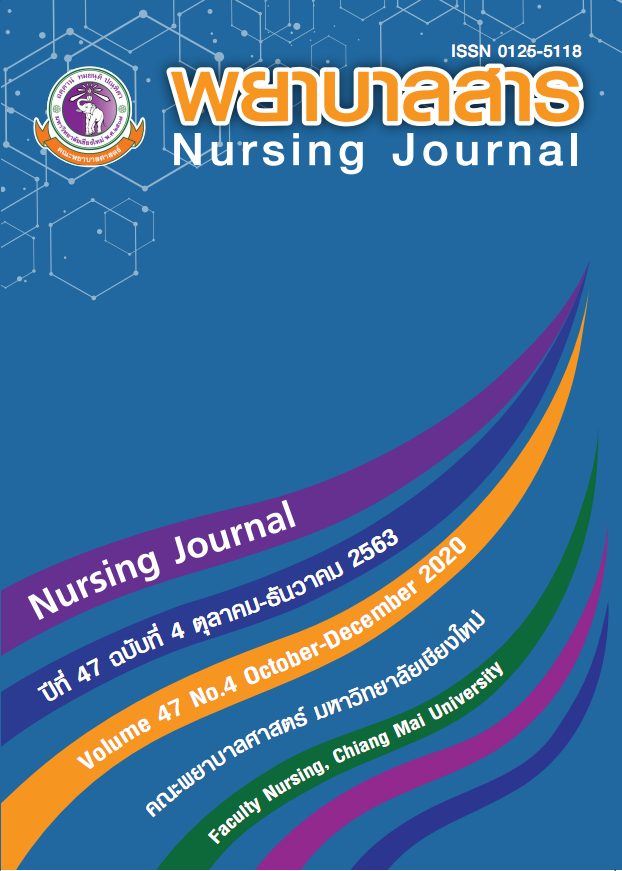The Socio-Cultural Context Affecting the Antenatal Care Among Pregnant Hilltribe Women, Chai Prakan District, Chiang Mai Province
Keywords:
Social Context, Cultural, Antenatal care, Pregnant, HilltribeAbstract
This study uses mixed method, qualitative and quantitative study. The objective of the research is to study socio-cultural context affecting the antenatal care among pregnant hilltribe women in Chai Prakan District, Chiang Mai Province. Tools used to study quantitative data consist of questionnaires regarding general information, data involving antenatal care, knowledge in attending antenatal care service and attitude towards receiving antenatal care service which pass inspection in content validity by scholars value is equivalent to 0.85, confidence value of the questionnaire for knowledge regarding attending antenatal care service is equivalent to 0.83, confidence value of the attitude questionnaire regarding receiving antenatal care service is equivalent to 0.84. The sample group consists of 142 people. Analyze data by frequency distribution, percentage, mean and standard deviations. Tool used to study qualitative data is structured interview with the sample group of 8 people. Analyze data using content analysis to find proposition both overview and in the component of fact that occurs in each aspect.
Research results found that:
Majority of the sample group have knowledge regarding attending antenatal care service at low level and also found that attitude in attending antenatal care service of sample group level agree “attending first antenatal care within 12 weeks is important and beneficial” is in the least. Therefore, within the community together with related agencies should initiate activities to promote knowledge in pregnant hilltribe women to be knowledgeable and have good attitude towards pregnancy including encouraging families to participate in supporting antenatal care of pregnant hilltribe women in order to see the importance of antenatal care and attend first antenatal care within 12 weeks. The study also found that most of the sample group believe in intangible stories such as ghosts, the dead because they believe that if the ghosts address them, the baby would be gone so they tend to have antenatal care after 12 weeks. Hence, within the community together with related agencies should promote knowledge and belief in order for pregnant women to change attitude making positive attitude towards pregnancy within 12 weeks and meet 5 times according to the criteria.
References
Belayneh, T., Adefris, M., & Andargie, G. (2014). Previous early antenatal service Utilization improves timely booking: Cross-sectional study at university of Gondar hospital, Northwest Ethiopia. Journal of Pregnancy, 3, 1-7.
Khongdet, P. (2008). Self-care behavior of female antenatal care at Narathiwat Hospital Rajanagarindra. Narathiwat: Narathiwat Hospital. (In Thai)
Ministry of Public Health. (2017). WHO Awakening the trend of mother's health campaign World Health Day 2017. Bangkok: Ministry of Public Health. (In Thai)
Pheungphang, A. (2011). Nonpharmacologic approaches to relieve labor pain in the first stage of labor: the research utilization. Bangkok: Danex Inter-cooperation. (In Thai)
Phornphit, O. (2009). Factors predicting health promoting behavior of pregnant women working in food industry, Saraburi province. Bangkok: Thammasat University. (In Thai)
Silpa-anan, D. (2014). Antenatal care: Perspectives of pregnant women in Bangkruai Hospital Nonthaburi Province. Journal of Preventive Medicine Association of Thailand, 4(2), 125-134. (In Thai)
Srisuk, R. (2016). Factors influencing initiation of antenatal care within the first 12 weeks of pregnancy among pregnant women visiting antenatal clinics in Phanut Nikhom district, Chon Buri Province (Master’s thesis, Burapa University).
Tariku, A., Melkamu, Y., & Kebede, Z. (2010). Previous utilization of service does not improve timely booking in antenatal care: Cross sectional study on timing of antenatal care booking at public health facilities in Addis Ababa. Ethiopian Journal of Health Development, 24(3), 226-233.
Techakampholsarakit, L. (2018). Interventions to promote anemia prevention among pregnant women: A systematic review. Nursing Journal, 45(1), 62-74. (In Thai)
Vapy, M. (2013). Perceived benefits, perceived barriers of health promotion and health promoting behaviors of pregnant women, The Lao people’s democratic republic (Master’s thesis, Chiangmai University). (In Thai)
Villar, J., & Bergsjo, P. (1997). Scientific basis for the content of routine antenatal care. I. Philosophy, recent studies, and power to eliminate or alleviate adverse maternal outcomes. Acta Obstet Gynecol Scand, 76(1), 1-14.
Wayne, W. D. (1995). Biostatistics: A foundation of analysis in the health sciences. New York: John Wiley & Sons, Inc.
Downloads
Published
How to Cite
Issue
Section
License
บทความที่ได้รับการตีพิมพ์เป็นลิขสิทธิ์ของวารสารพยาบาลสาร
ข้อความที่ปรากฏในบทความแต่ละเรื่องในวารสารวิชาการเล่มนี้เป็นความคิดเห็นส่วนตัวของผู้เขียนแต่ละท่านไม่เกี่ยวข้องกับมหาวิทยาลัยเชียงใหม่ และคณาจารย์ท่านอื่นๆในมหาวิทยาลัยฯ แต่อย่างใด ความรับผิดชอบองค์ประกอบทั้งหมดของบทความแต่ละเรื่องเป็นของผู้เขียนแต่ละท่าน หากมีความผิดพลาดใด ๆ ผู้เขียนแต่ละท่านจะรับผิดชอบบทความของตนเองแต่ผู้เดียว






